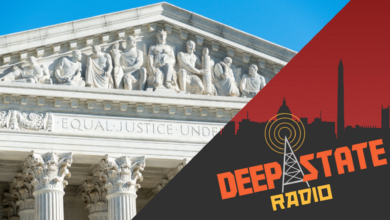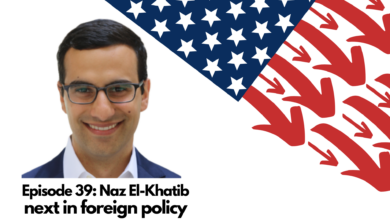Why Is Adam Schiff Making the President So Nervous? Transcript

Recording: 00:13 This is one of Deep State Radio’s briefs and debriefs.
David Rothkopf: 00:26 Hello, and welcome to this week’s episode of National Security Magazine. I’m David Rothkopf, your host and I am joined today by Representative Adam Schiff, who is the Chairman of the House Intelligence Committee. Welcome, thank you for joining us.
Adam Schiff: 00:45 It’s great to be with you.
David Rothkopf: 00:48 Clearly, in the past 24 hours, you’ve been making a lot of news with the announcement of the broader scope of the investigation of the committee and you have, seemingly, gotten under the skin of the President of the United States, who has accused you of Presidential harassment. I was wondering what your response was to this accusation of Presidential harassment.
Adam Schiff: 01:14 Well, this President, who has had two years without any oversight whatsoever, so I guess I’m not surprised at one level, that he would consider any oversight to be harassment. But we’re going to do our job; he needs to do his. Part of our job as a co-equal branch of government is to ferret out any kind of malfeasance or corruption within the administration. We also have an obligation to protect the country against any counterintelligence threat. For that reason, we have for a year and a half now, been looking at Russia’s interference in our election, the Russian ties to the Trump campaign.
Adam Schiff: 01:53 But also, whether the Russians hold any financial leverage over the President of the United States. I know the President has tried to draw a red line around his business, but we saw the perils in that with the revelations about Moscow Trump Tower. And that is, here was a business deal the President was trying to put together in secret during the Presidential campaign. A deal that, according to the pleadings of the special counsel, stood to make him potentially hundreds of millions of dollars, one of the most lucrative deals of his life; maybe the most lucrative.
Adam Schiff: 02:28 They were privately seeking to get the Kremlin’s help to make it happen and at the same time, the Russians were seeking to have sanctions lifted, something worth billions to the Russians. Now, that’s a real threat to our national security. It holds out the potential that the President is acting in a way that’s in his personal interest, his financial interest, but not in the national interest. That was something going on during the campaign. Whether that continues to this day, because there are hidden financial relationships, I think it’s important for us to find out.
David Rothkopf: 03:03 Now, the investigations into these areas have, at least in theory, been going on prior to your arrival as the chair. Yesterday, in walking out of your meeting, your predecessor as the chair, Devin Nunes, appeared to be somewhat agitated, snapping at reporters, saying that they weren’t really doing their jobs. One of the things that seems to be included in the scope of your investigation is whether the President received assistance in his efforts or efforts to obstruct the investigation from whomever, including potentially, members of Congress. I was wondering if you would comment on that.
Adam Schiff: 03:52 Well, you know, members of Congress have a wide berth under the Speech or Debate Clause and now, that doesn’t allow members of Congress to commit crimes anymore than anybody else. But there’s a mechanism within the Congress that people do things that are considered to be unethical and then, we have an Ethics Committee for that purpose, however imperfect it’s functioning may be from time to time. I don’t want to comment on the actions of particular members. I will say that we’ve had, obviously, good reason to be concerned about efforts to obstruct the Congressional investigation, not just the Mueller investigation.
Adam Schiff: 04:31 The indictment of Roger Stone lays out in great detail why we need to be concerned about this. He is now the second individual close to the President who has been charged or prosecuted for making false statements. But in Roger Stone’s case, it extended to efforts to intimidate other witnesses and prevent them from testifying before our committee. We’re going to do our best to ferret out any efforts to impede our work. We’re also going to insist on getting answers to questions The witnesses came in and refused to answer and not because they claimed privilege, but because they just didn’t feel like it. And the Republican-then majority wasn’t interested in getting answers and told them, basically, that’s perfectly fine. You can’t run an investigation that way. Obviously, we’re going to use a different approach.
David Rothkopf: 05:22 Clearly, some of these issues came up in the course of the investigation over the past couple of years, regarding the President’s financial ties. Would you say it’s fair to say the avenues you wanted to pursue were impeded by the majority during those couple of years?
Adam Schiff: 05:45 Without a doubt; those and others. There were any number of investigative threads that we wanted to pursue, including allegations that, for example, the Russians were attempting to use the NRA as a secret back channel or were attempting to infiltrate the NRA. Well, we now have the indictment and prosecution of Maria Butina. And all too often, the response of our members’ last session was there’s nothing to see here. Well, if you aren’t willing to look, then yes, you’re going to find nothing to see.
Adam Schiff: 06:15 But there has been all too much to see, as it turns out. There are people who came for a committee and they weren’t willing to tell us the full truth or even to answer whole categories of questions. So, there were efforts to curtail what we could do, to impede what we could do to allow witnesses to evade answering and that has now changed. We certainly welcome the participation of the Republicans in the investigation going forward. They had ceased their work on it about nine months ago. I expect that they will rejoin the investigation. I hope it will be in a constructive fashion.
Adam Schiff: 06:55 We’ll certainly encourage that, but ultimately, they’ll have to make the decision about whether they wish to do so or whether they wish to act as an extension of the President’s legal defense team.
David Rothkopf: 07:07 Is further investigation into the ties between the Russians and the NRA part of the new brief?
Adam Schiff: 07:14 It is. It is. Obviously, there’s already evidence in the form of the case against Maria Butina that the Russians were, in fact, attempting to cultivate that relationship for the purposes of influencing US policy. It is not an unexpected kind of a covert influence operation, but how deep it went, whether there were any efforts to funnel money through the NRA, what may have come out of some of the efforts that have been made public through the indictment of Butina, there’s more work to be done. And there were witnesses we did want to bring in that the majority refused that we’re in a position now to pursue.
David Rothkopf: 07:58 Another thing you did was release the transcripts of testimony to the committee to the Mueller investigation. Presumably, this is to enable them to further consider instances of lying to the committee. Do you anticipate that there will be more charges brought as a consequence of this?
Adam Schiff: 08:23 I don’t know. Bob Mueller is in a better position with respect to many of these witnesses to know if they were telling the truth or if there’s a provable case of perjury or false statement. Since so much of our work was curtailed in the last session, we have access to less information, I think, on the whole, than the special counsel. Although there are important areas where we have information, the special counsel may not. Our purpose in sending the transcripts to the special counsel’s office for any use to which they may be necessary is not only to allow perjury charges to be brought where appropriate, but also so that the special counsel has access to the facts in the record thus far, for the purposes of the prosecutions or for the purpose of filling out his report.
Adam Schiff: 09:14 We have done our best to provide that information. We’re doing our best to deconflict with work that special counsel is doing, but it’s also very important that we do our own independent work, particularly since the nominee for Attorney General has made no commitment to sharing the results of Bob Mueller’s work with us.
David Rothkopf: 09:35 Do you see yourself as a kind of fail-safe or parallel investigation in the event that the Mueller results are kept private or somehow, the Mueller investigation is constrained?
Adam Schiff: 09:49 We’re going to do everything we can to make sure that the Mueller report is provided to Congress and is made public. But we have a separate role and responsibility than the special counsel. At heart, his job is to determine who broke the law and who should go to jail. It’s not necessarily to tell the country what happened. That’s Congress’ responsibility. And, not only to tell the country what happened, but to determine what steps need to be taken to protect the country going forward.
Adam Schiff: 10:16 Those are both important responsibilities, so that is to do justice, but also to protect the country. They can be done in parallel and will need to be and have been thus far. But, there’s a particular, I think, importance to our work, given that we may face opposition from the White House and the Justice Department when it comes to the release of the Mueller report.
David Rothkopf: 10:43 I understand we’ve only got about four or five minutes and I want to be respectful of your time. So let me break that down into two more questions: The President of the United States seemed very agitated by the announcement. Once again, he settled into name-calling with you, not quite as colorfully as he did the last time. But nonetheless, he took his shots. In part, it’s because he has laid out this red line, which is don’t get involved into my family’s finances. You mentioned earlier, Russia is one area, obviously, in which to look.
David Rothkopf: 11:15 But, I think many people took from the description of the scope of the investigation, the fact that it may well lead to other countries, notably, for example, Saudi Arabia, but perhaps also Turkey, the United Arab Emirates, other places where they’ve done business. I was wondering if you might comment on that and the degree to which you looked, not only at the way the President might be compromised, but the Trump organization, the Trump children, the Trump in-laws and so forth.
Adam Schiff: 11:51 Well, yes, our charter is broad. Our charter involves any credible allegation that the security of the country may be compromised by foreign financial interests. And that extends, obviously, to countries other than Russia. Now, the President has, for example, not so long ago, talked about how much he loved the Saudis because the Saudis were spending tens of millions of dollars buying Trump properties. Why wouldn’t he love the Saudis, he has asked rhetorically.
Adam Schiff: 12:22 Well, perhaps, he loves them too well because of that financial relationship. And we certainly have seen an unprecedented policy of favoritism toward Saudi Arabia, in terms of the dispute between Saudi Arabia and Qatar, in terms of the role that the Saudis are being given in the peace process, the deference that has been shown Saudi Arabia in the war in Yemen, the President’s dissembling about the murder of Jamal Khashoggi, in a way that is beneficial to the Crown Prince. All this might be explained by a President with poor judgment or lack of experience, but it also might be explained by financial inducements.
Adam Schiff: 13:12 The American people have a right to know and a need to know that the President is acting in their behalf and not for some pecuniary reason, whether that’s his own fortune or his son’s fortune or his daughter’s or his son-in-law’s. Obviously, he’s given his kids and his son-in-law great responsibilities in terms of the running of the administration, the guidance on foreign policy. I mean, his son-in-law is apparently one of the primary parties responsible for a Middle East peace plan, if there is to be one.
Adam Schiff: 13:46 So, yes, if any of those parties are seeking financial support or financing of buildings or there was any intersection between business and US policy, then that needs to be exposed.
David Rothkopf: 14:05 Does that extend, by the way, far as financers of the President’s campaign. I mean, some of the people who have been principle underwriters of the campaign have been stakes in Israel and other places. Will you look beyond to those, as well?
Adam Schiff: 14:23 We will certainly look at issues like the Trump inauguration committee, which has been much in the news lately, owing to a subpoena, reportedly from the southern district of New York. But here’s an important distinction: There are a number of allegations about the Trump inauguration committee. There are a lot of allegations about the Trump organization, the Trump business. Some of those are within our purview and concern and others are not.
Adam Schiff: 14:48 There have been repeated allegations about the unscrupulous business practices of the Trump organization. That’s not of interest to our committee. Our committee is focused on any financial relationship that could compromise our national security. Similarly, the inauguration committee, if foreign countries were illegally funneling money into that committee, which raised a fortune, but didn’t seem to do much with it, as a way of influencing US policy, it needs to be exposed.
Adam Schiff: 15:17 It’s also alleged, though, the Trump inauguration committee was misspending its funds. That the Trump family, through its businesses was profiting by charging excessive rates at their hotels to the inauguration committee, that’s a completely different issue and that’s not particularly of interest to our committee, although it may be of interest to others.
David Rothkopf: 15:34 And to other committees. Given that we just have one moment left, a story has broken very recently, the one of the ways that you’ve gotten under the White House’s skin in the past 24 hours and that’s likely to continue. At the moment, they say you’re “going nuts” with this investigation. Clearly, it sounds to me like a rational pursuit of things that should have been pursued for a long time, but one of the things that seems to have gotten under their skin is an assertion that your committee has been hiring former Trump NSC staffers.
David Rothkopf: 16:12 The implication, and it seems a kind of bizarre one to me, but is somehow you’re poaching people away from the White House for this investigation. I just wanted to give you a chance to comment on that since that seems to be making a little bit of news at the moment.
Adam Schiff: 16:26 Well, I have to say, it would be amusing if it wasn’t so absurd that the President is worried that we’re stealing staff from the White House. If he’s concerned about that, maybe he should concentrate on being a better employer. The reality is, in addition to our Russian investigation, we have a broad oversight responsibility of the intelligence agencies. That is really the bread and butter of our work and we hire people from the NSC. And we hire people from the CIA and we hire people from NSA and we get people with expertise.
Adam Schiff: 17:00 I don’t think we’ve directly hired anyone from the White House, although there are people who have served on the NSC in the Obama administration and the Trump administration and they have even served in both administrations. We don’t tell people that we won’t consider them because of their prior employment. I think the President ought to worry more about the working conditions of the people that work for him and the morale problem that may be there and the professionalism problem that is clearly there, than worrying about who we’re hiring.
David Rothkopf: 17:38 Well, thank you for taking the time. Just quickly, when might we expect the first set of hearings from the committee?
Adam Schiff: 17:46 We’re having our first hearing in the last week of February. It will be an open hearing on the rise with authoritarianism. To me, this is the big untold story of the last couple of years as people have been following the minutia of the Russian investigation and what did Rudy Giuliani say in the morning and how did he contradict that in the afternoon and how did he contradict it again in the evening? It’s easy to miss the big picture and the big picture is that while the Russians interfered with our election in 2016 and again, to a different degree in 2018, and that was new and appalling for us, it isn’t new for Europe, where they’ve interfered for a long time.
Adam Schiff: 18:27 And quite beyond Russia, there is a real challenge to the very idea of liberal democracy around the world, as we are seeing a demonstrable rise of autocracy in places like the Philippines, in Brazil, in Hungary, in Poland; in the rise of far-right parties in Austria and in France and in Germany. In Turkey and in Egypt, all over the world, there is a rise of authoritarianism. It is something that America needs to pay attention to. It’s something we need to push back against. Normally, we would have a President of the United States doing exactly that and making common cause with our fellow democracies. But instead, our President is making common cause with the autocrats.
Adam Schiff: 19:15 This, I think, is shaping up to be the big ideological struggle of our time. Not communism versus capitalism, but representative government and democracy versus authoritarianism. So, that will be our first hearing. That will be a recurrent focus of ours because I think this is a real danger to our own way of life.
David Rothkopf: 19:35 Presumably, there’s an investigative crossover. Many of the same characters, Cambridge Analytica, for example, occur in the Russian Brexit intervention. People like Steve Bannon occur in supporting the rise of nationalists in Europe and so forth. So, one thing one might do is see the intervention in the US and the intervention in Europe as part of a comprehensive Russian initiative, right? And I assume you’re going to try those threads together?
Adam Schiff: 20:09 There certainly are connections and among the most profound were Russian involvement in Brexit and Russian involvement in the Trump campaign. The parallels are frequent and disturbing. But, I don’t want to focus excessively on the Russian role in this because the broader phenomenon around the world is driven by something, I think, quite different and that is forces of massive economic disruption, brought about by globalization and automation that are causing millions of people to lose their jobs through no fault of their own. And those causes of economic turmoil, which manifest themselves in migration in Europe and other forms in other places, are helping to drive this trend towards authoritarianism and autocracy and right-wing populism and xenophobia. So, I think we need to pay attention to the economics of all of this. It’s a challenge we also have to face at home.
David Rothkopf: 21:16 Well, thank you very much. I think, as any other American, there are a lot of other questions I’ve got and hopefully, we’ll have you back again sometime. But, for our listeners, clearly in listening to Adam Schiff, you can hear that the winds of change have come to Washington and we are about to enter a new period in this presidency. We’re about to learn about a lot of things that have been kept from the public eye. We look forward to seeing how this evolves and we hope you’ll join us again. Thank you very, very much, Congressman Schiff.
Adam Schiff: 21:49 Thank you and take care.
Recording: 21:52 Deep State Radio is a production of the Deep State Radio Network, a division of TRG Interactive Media. Our podcast today was produced in cooperation with Goat Rodeo Productions and was supervised by Ian Enright. Join us again for another episode of Deep State Radio. If you don’t, we know where to find you.




